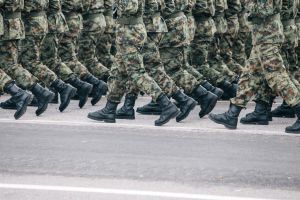Air Force Dumped War Dead Remains in Landfill
The Air Force acknowledged on Tuesday that between 2003 and 2008 the Dover Air Force Base mortuary had practiced a burial procedure for some of America’s war dead that many find to be unjust. Portions of troops’ bodies were cremated and then disposed of in a landfill in Virginia, unknown to the surviving family members.
The practice, according to the Air Force, applied to body parts that were either not found before the funerals or were unidentified and not to entire bodies. Since 2008, the Air Force has changed its policy and now the body parts are cremated and disposed of at sea for a more respectful burial.
The acknowledgement of past burial techniques came after inquiries from The Washington Post which first reported the story.
Lt. Gen. Darrell G. Jones, the Air Force’s deputy chief for personnel, likened the previous procedure to “the disposal of medical waste,” according to The Washington Post.
In most cases, The Washington Post found that the Air Force failed to notify family members of the missing limbs.
The findings came after an 18-month internal Air Force investigation concluded that there had been a “gross mismanagement” at the Dover mortuary, the largest in the nation. Most corpses that go through Dover are from soldiers killed in battlefields overseas.
The Washington Post also revealed that workers at the morgue had “lost body parts and sawed off a soldier’s arm so his body would fit in a casket.”
Air Force spokesman Ltc. John Dorrian told The Christian Post that the Air Force has taken the necessary steps to ensure the proper oversight in handling the deceased.
“In the investigation, the Air Force determined that there were systemic issues that the leadership failed to address. In response, a number of measures have been taken to ensure that there is a standard operating procedure in handling burials. There has also been an increase in technology security on the premise such as cameras, swipe card access, and others to make sure only certain people allowed there have access.”
The three supervisors at the morgue were removed from their supervisory positions but were not fired. The commanding supervisor, Col. Robert Edmondson, had already moved to a new position as is customary in the military every two to three years. However, he received a letter of reprimand halting his promotion potential. The two others were civilians, Trevor Dean and Quinton Keel. They were moved to other non-supervisory jobs at Dover.
Following the internal investigation, the Office of Special Counsel reported on its own investigation into the matter on Tuesday. According to The New York Times, the investigation found that Keel tried to cover up the mistakes by firing the whistle blowers. The counsel’s letter following the investigation stated that “although the Air Force had taken many important steps to correct problems, Mr. Keel and Mr. Dean should have been fired,” according to The New York Times.
Gari-Lynn Smith’s husband was blown up in Iraq in 2006. His remains were disposed of in the landfill.
“My only peace of mind in losing my husband was that he was taken to Dover and that he was handled with dignity, love, respect and honor,” Smith told The Washington Post.
“That was completely shattered for me when I was told that he was thrown in the trash.”
“The Chief of Staff has made it clear that we hold it our duty to care for and provide dignity and honor to the fallen,” said Dorrian. “It is absolutely critical and important that the Air Force Mortuary Affairs Operation look upon this as a sacred duty. The individuals that came forward and identified areas to be improved have provided us an opportunity to address those issues.”





























